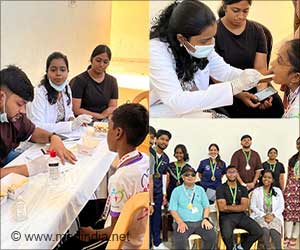Lee Cruceta, a nurse from Philadelphia, better known as the lead 'cutter' in the notorious US corpse plunder case, admitted Wednesday that he had cut body parts from as many as 244 corpses.
The looted parts were subsequently transplanted to unsuspecting patients in the US and Canada.Cruceta’s $180,000-a-year role as 'the right-hand man' to Michael Mastromarino, the mastermind, earned him the dubious distinction of being a modern-day body snatcher.
He pleaded guilty to conspiracy, taking part in a corrupt organization, abuse of a corpse and 244 counts each of theft and forgery. He is in a deal for a lower sentence.
Lee Cruceta had never committed a crime, until he overlooked the protocols for harvesting tissue and supplying blood to intermediary companies that provided tissue to hospitals for implants, according to Assistant District Attorney Bruce Sagel.
Sagel told Common Pleas Judge Leon W. Tucker that since his arrest last year, Cruceta, 39, had 'cooperated fully' with authorities.
As part of his plea, Sagel and Maran negotiated a prison sentence of six years and eight months, concurrent in both states. Cruceta had been facing a maximum of 1,700 years in jail, if convicted of more than 1,000 counts.
Advertisement
His lawyer, Mario Gallucci, earlier said Mastromarino planned to tell prosecutors about the companies that bought the stolen specimens.
Advertisement
'I think the concern is Lee Cruceta has been placed, in some ways, on an even footing with Mr. Mastromarino, who has millions of dollars,' defence lawyer Mary Maran said.
Cruceta, speaking after the hearing, said he was already earning more than $100,000 a year working two jobs when he signed on with Mastromarino, thinking his Biomedical Tissue Services (BTS) was a legitimate company. Asked when he realized things were amiss, he declined comment.
'We were a normal family. We had a normal life,' said his wife, Theresa Cruceta, standing with their three young children. 'We lost everything.'
She lost her hospital administration job in New York in the economic downturn that followed the 2001 terrorist attacks, she said. Cruceta previously worked as a surgical nurse manager and at a tissue bank but said he thought he could ultimately earn more working for Mastromarino.
The body parts were used in disc replacements, knee operations, dental implants and other surgical procedures performed by unsuspecting doctors across North America.
About 10,000 people received tissue supplied by BTS.
Sagel explained to the judge how the multimillion-dollar scam worked: Mastromarino or Cruceta would receive a call notifying them that there were bodies to be harvested in Philadelphia.
In February 2004, Mastromarino had entered into agreements with three funeral-home operators, co-defendants James McCafferty Jr. and brothers Louis and Gerald Garzone, to provide body parts from corpses from their respective funeral homes. 'When cutters came to Philadelphia, they were not given information intentionally,' said Sagel. 'Each body was given a number, rather than a name, and they were not told the bodies had sepsis, cancer or HIV.
'All the medical records were forged' with phony names, ages, dates of death and claims of being disease-free, said Sagel. Cruceta admitted falsifying some documents and substituting disease-free blood for the bad blood that accompanied contaminated tissue, later used in transplants.
Mastromarino paid each funeral-home operator $1,000 for each body, for a total of more than $250,000. Sagel said that some bodies from other funeral homes were diverted from Liberty Cremation, and harvested for parts before cremation, but that the operators of those funeral homes had no knowledge of the scam.
BTS then sold the tissue from each corpse for $10,000 to intermediary processors, such as RTI Technologies, of Aluchua, Florida, before the tissue was resold to hospitals for as much as $100,000 for implants, Sagel added. Tucker set sentencing for June 30.
A flood of civil lawsuits are expected on behalf of the transplant recipients.
India in 1994, accepted the concept of brainstem death and passed an act to this effect and called it the 'Transplantation of Human Organ Act' (THO). The act also proposed to stop commercial dealing of organs by making regulatory authorities in each state to look into the whole process of organ donation for both live related (or unrelated) and cadaver organ donation and transplantation.
Source-Medindia
GPL/K






